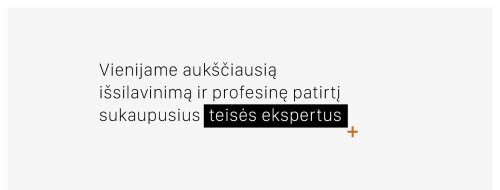Best Employment Rights Lawyers in Kaunas
Share your needs with us, get contacted by law firms.
Free. Takes 2 min.
List of the best lawyers in Kaunas, Republic of Lithuania
About Employment Rights Law in Kaunas, Republic of Lithuania
Employment rights in Kaunas are governed primarily by the Labour Code of the Republic of Lithuania, which sets out the relationship between employees and employers across the country. This code ensures fair treatment, protects workers against unjust dismissals, regulates working hours, holidays, and minimum wages, and outlines both employee and employer obligations. Kaunas, being one of Lithuania's largest cities and an important economic hub, closely follows these national standards while also having local resources and institutions to assist those who seek guidance or remedies in employment-related matters.
Why You May Need a Lawyer
Several situations might require the help of a legal professional who specializes in employment rights. Common reasons include unlawful termination, discrimination in the workplace, wage disputes, or matters regarding employment contracts. Employees who feel their rights have been violated or who face workplace harassment might need assistance to ensure fair treatment or compensation. Employers may also require legal advice to ensure compliance with labor laws, to draft proper contracts, or to manage complex employment disputes. Having legal counsel can be crucial for both sides in navigating the often complex legal procedures and for protecting one's interests.
Local Laws Overview
In Kaunas, as in the rest of Lithuania, employment relationships are regulated by the national Labour Code. Key aspects of local employment law include:
- Employment Contracts - Every employment relationship must be formalized by a written contract outlining working conditions, duties, wage, and other essential terms.
- Working Time and Overtime - Standard working week is 40 hours. Overtime is allowed but usually cannot exceed 8 hours per week and must be paid at higher rates.
- Minimum Wage - A national minimum wage applies. Employers must pay at least this rate, which is periodically reviewed by the government.
- Paid Leave - Employees are entitled to a minimum of 20 working days of paid annual leave. Additional leave may be available in specific circumstances.
- Termination Protections - The law prescribes reasons and procedures for dismissal. Notice periods, severance payments, and protections against unfair dismissal are clearly laid out.
- Non-discrimination - The law prohibits discrimination based on gender, race, nationality, language, origin, social status, religion, beliefs, or other grounds.
- Health and Safety - Employers are obliged to provide safe working conditions and conduct regular health and safety training.
- Collective Rights - Employees can form or join trade unions which have additional rights regarding collective bargaining and representation.
Employment disputes may be handled by specialized labor dispute commissions or by courts in more serious cases.
Frequently Asked Questions
What is the legal minimum wage in Kaunas?
The minimum wage in Kaunas aligns with the national minimum wage established by the Lithuanian government. This amount is subject to periodic adjustments, so it is advisable to check with official sources for the current rate.
Can I be dismissed from my job without a reason?
No. Lithuanian labor law requires that employers have a lawful reason to terminate employment. The dismissal process must follow proper procedures and provide the required notice period or compensation.
Am I entitled to severance pay if I am dismissed?
Yes. Most dismissed employees have the right to severance pay, the amount of which depends on the duration of employment and the reason for dismissal.
How many hours can I legally work in a week?
The standard workweek is 40 hours. Overtime cannot usually exceed 8 hours per week, and total working time including overtime is regulated to protect employees.
What are my rights regarding working conditions and safety?
Employers must ensure safe and healthy working conditions, provide necessary training, and supply protective equipment if required. Employees may refuse unsafe work without penalty.
How do I report workplace discrimination or harassment?
You can report instances of discrimination or harassment to your employer, the labor inspectorate, or relevant authorities. Trade unions and legal aid services can also assist you in filing complaints.
Do I have to sign an employment contract?
Yes. All employment relationships must be formalized with a written contract signed by both parties before work begins.
What rights do fixed-term contract employees have?
Fixed-term contract employees generally have the same rights as permanent employees regarding payment, holidays, and protection from unfair dismissal unless otherwise specified in the law.
Can an employer change my working hours without consent?
Working hours should only be changed by mutual agreement, except in special cases outlined by law. Forced changes without consent are generally not permitted.
Where can I go if I have an employment dispute?
You can first try to resolve disputes through discussion with your employer. If unsuccessful, you may apply to the Kaunas Labour Disputes Commission or file a claim with the court. Trade unions and legal professionals can offer support throughout this process.
Additional Resources
Those seeking more information or assistance regarding employment rights in Kaunas can contact:
- State Labour Inspectorate of the Republic of Lithuania – The primary body overseeing labor law compliance and workplace safety
- Kaunas Labour Disputes Commission – Handles settlement of employment disputes
- Legal Aid Services – Available for those who qualify for free or low-cost legal assistance
- Trade Unions – Offer support, advice, and representation to their members
- Human Rights Monitoring Institute – Provides information and advocacy regarding anti-discrimination issues
Next Steps
If you feel your employment rights have been violated or you need guidance, start by collecting all relevant documents such as your employment contract, payslips, correspondence, and any evidence of unfair treatment. Reach out to your employer for clarification and try resolving the issue internally when possible. If this does not bring a solution, consider consulting the Kaunas Labour Disputes Commission, a local lawyer, or a trade union representative for professional assistance. Acting promptly is crucial as some claims are subject to legal deadlines.
Remember, understanding your employment rights is an important step towards protecting your interests in the workplace. Do not hesitate to seek help if you are uncertain about your situation or options.
Lawzana helps you find the best lawyers and law firms in Kaunas through a curated and pre-screened list of qualified legal professionals. Our platform offers rankings and detailed profiles of attorneys and law firms, allowing you to compare based on practice areas, including Employment Rights, experience, and client feedback.
Each profile includes a description of the firm's areas of practice, client reviews, team members and partners, year of establishment, spoken languages, office locations, contact information, social media presence, and any published articles or resources. Most firms on our platform speak English and are experienced in both local and international legal matters.
Get a quote from top-rated law firms in Kaunas, Republic of Lithuania — quickly, securely, and without unnecessary hassle.
Disclaimer:
The information provided on this page is for general informational purposes only and does not constitute legal advice. While we strive to ensure the accuracy and relevance of the content, legal information may change over time, and interpretations of the law can vary. You should always consult with a qualified legal professional for advice specific to your situation.
We disclaim all liability for actions taken or not taken based on the content of this page. If you believe any information is incorrect or outdated, please contact us, and we will review and update it where appropriate.
















